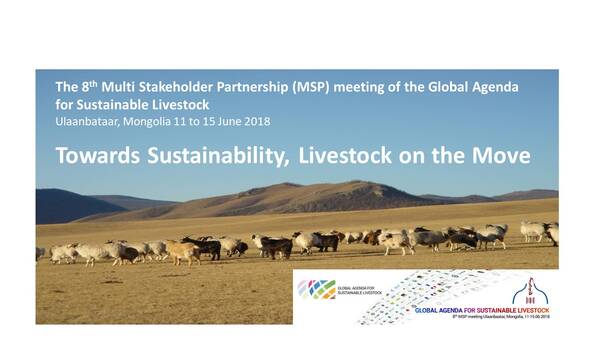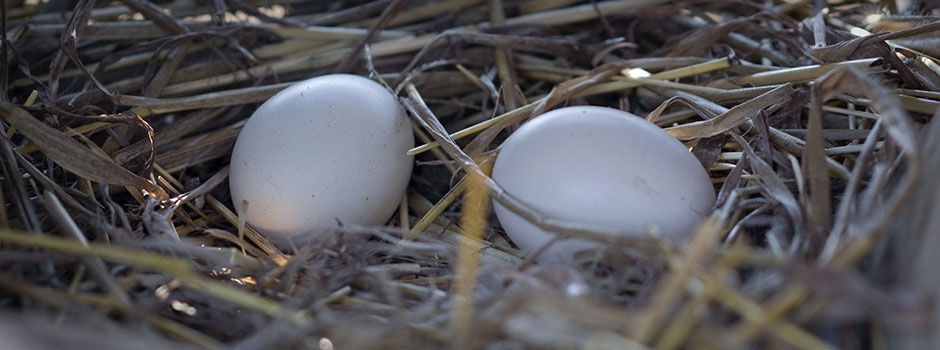- Multi-stakeholder meetings
- 13 MSP, Chiang Mai, Thailand, 30 Oct–3 Nov 2023
- 12th MSP, Dublin 3-7 October 2022 (Hybrid)
- 11th MSP online, 7-11 June 2021
- 10th MSP online, 14-18 September 2020
- 9th MSP, Kansas, 9-13 September 2019
- 8th MSP, Ulaanbataar, 11-15 June 2018
- Addis Ababa, 08-12 May 2017
- Panama, 20-23 June 2016
- Cali, 7-10 October 2014
- Ottawa, 15-17 October 2013
- Nairobi, 22-24 January 2013
- Phuket, 1-4 December 2011
- Brasilia, 17-21 May 2011
- Focus Area Workshop
- Webinars
- Others
Livestock on the move – Global Agenda meeting underway in Mongolia

Livestock agriculture is unlike all other types of agriculture because its products move; they are mobile. This provides opportunities and challenges. It also substantially influences the lives of the people who keep livestock, making many of them as mobile as the herds and flocks they keep.
The theme of the 2018 Global Agenda on Sustainable Livestock meeting – ‘livestock on the move’ – is inspired by its location in Mongolia, where mobile livestock keeping is a mainstay of many livelihoods and the economy as the whole.
The theme is much more than livestock moving to search out seasonal feed resources. It also embraces the rapid dynamics in the global livestock sector; with shifts from smallholder production to more intensive, vertically integrated and geographically concentrated livestock systems. It captures increases in trade, at a range of scales, not only in livestock products but also in live animals and feed resources, and virtual trade in commodities such as nitrogen and water. It also covers the emergence and movement of pathogenic agents associated with livestock production, such as avian influenza viruses and the genetic determinants of antimicrobial resistance.
Movements of many kinds are a far more prominent features of today’s livestock agri-food systems and are likely to become even more so at these systems respond to the ever-growing demand for animal source foods.
Livestock agenda on the move
The meeting comes at a key moment. While livestock may move, the livestock agenda is certainly also on the move as evidenced by recent discussion in the 23rd session of the Conference of the Parties (COP 23) to the UN Convention on Climate Change and the 10th Global Forum for Food and Agriculture (GFFA) and its official communique signed by 69 ministers of agriculture. At the United Nations also, the General Assembly approved two resolutions with strong messages about livestock:
- Resolution 72/238 (Agriculture development, food security and nutrition) recognizes that “livestock contributes 40 per cent of the global value of agricultural output and supports the livelihoods and food security of almost 1.3 billion people, and in this regard acknowledging that the sector offers opportunities for sustainable agricultural development, poverty eradication and food security gains, and offers an opportunity for climate awareness.”
- Resolution 72/215 (Agricultural technology for sustainable development) recognizes that “the livestock sector is a powerful engine for the development of the agriculture and food sector, food security and nutrition, a driver of major economic, social and environmental changes in food systems worldwide and a uniquely powerful entry point for understanding the issues around sustainable agricultural development as a whole.”
Movement such as this is positive but also calls for livestock stakeholders to work together to grasp the opportunities to make sure that livestock development is sustainable.
This is exactly what the Global Agenda is about. This 8th multi-stakeholder partnership meeting is an opportunity for the partners to examine the changes and devise action plans that address four global livestock sustainability priorities:
- food and nutrition security
- livelihoods and economic growth
- health and animal welfare
- climate and natural resource use
Sharing lessons
Alongside this agenda, participants will share lessons and insights from research and practice. A half day policy forum will expose participants to conducive policies for sustainable nomadic herding in Mongolia while participants will share lessons on:
· Dairy in Asia
· Multiple functionality of grazing systems
· Best practices from the antibacterial world
· A field guide to investing in sustainable livestock
· Socio-economic contribution of pastoralism
· Guidelines and tools to measure socio-economic impact of the dairy sector
· Integrated approaches to improve the livelihoods and resilience of vulnerable small-scale livestock keepers in Mongolia
· Livestock, climate change and smallholder farmers in Latin America
· Main drivers of silvopastoral systems adoption by farmers in America
· Informing and influencing sustainable livestock investments with evidence and facts
· Peste des petits ruminants fighting rural poverty
· Maintaining mobility for good pasture management
· Sustainable and wildlife friendly cashmere projects
· Multi-stakeholder multi-disciplinary approach for sustainable livestock sector growth and transformation
· Effective and good quality proximity animal health services
· Strengthening nomadic herders’ traditional user groups for sustainable rangeland management
· Accelerating livestock research into impact
· Disease at the livestock/wildlife/ecosystem interface
· Support to employment creation in Mongolia
· Towards accurate statistics on antibiotics use in livestock farming
· The National Roundtables for Sustainable Beef
· Building sustainable livelihoods for herders
· Increasing sustainable performance with cattle genetics adapted to grasslands
· Animal source foods, health and nutrition, what is the latest evidence
Follow the meeting on Twitter: https://twitter.com/hashtag/livestockagenda?src=hash
Visit the meeting web page: https://bit.ly/2slwfhm
Story by Peter Ballantyne for GASL







